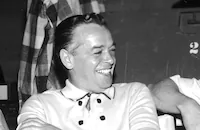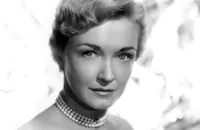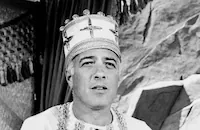Cash McCall

Brief Synopsis
Cast & Crew
Joseph Pevney
James Garner
Natalie Wood
Nina Foch
Dean Jagger
E. G. Marshall
Film Details
Technical Specs

Synopsis
Although still a young man, Cash McCall has already made and lost several fortunes by buying shaky business empires, making them profitable and selling them, while maintaining a low profile. Jealous gossips liken him to a "pirate," but Cash's dealings are always ethical and tend to benefit the people around him. Grant Austen, the owner of Austen Plastics, is weary of running his business and consequently, when Gen. Danvers, head of Scofield Industries, the company that buys sixty percent of Austen products, threatens to move his business to another company, Austen confides to Gilmore Clark of Corporate Associates, a management consultant company Austen has retained, that he wants to retire. Later, Austen tells his daughter Lory, a children's book illustrator with whom he often discusses business, that he did not reveal to Gil his company's precarious relationship with Scofield. Gil discusses Austen's case with his boss, Harrison Glenn, who suggests Cash as a potential buyer and arranges for Gil to meet Cash. At Cash's penthouse above a luxurious hotel, Gil learns that Cash owns a controlling interest in Corporate Associates. Impressed with Gil's business acumen, Cash offers him a job as his assistant. A noise in his kitchen alerts Cash to the presence of Maude Kennard, the hotel's assistant manager, who takes an unusually personal interest in the housekeeping services that the hotel supplies Cash. Meanwhile, banker Will Atherson tells Austen that Cash might be interested in buying his company. He introduces Cash to Austen and Lory, who has inherited ten percent of the company and who stiffly acknowledges that she already has met Cash. Cash invites Austen and Lory to his apartment to discuss the sale and, as a professional courtesy, explains that he owns Corporate Associates, so that Austen is aware of potential bias in Gil's advice. Cash asks about Danvers' interest in buying out Austen, but Austen says the general can only pay in stocks and cannot meet the asking price of $2,000,000. Cash agrees to Austen's price and suggests that Austen talk to his lawyer, Winston Conway, before finalizing the sale. While Austen is calling Conway, Cash tries to talk to Lory about the previous summer in Maine, but she refuses to listen, declaring that she no longer thinks of him. Not believing her, Cash pulls her into his bedroom where, prominently displayed, is a portrait she painted of the mythical Robin Hood, bearing a marked resemblance to Cash. When Austen returns, he accepts Cash's offer. On another day, Cash drops by the Austen household to discuss a trifling business detail. Miriam, Austen's wife, immediately sees him as marriage material for her daughter and finagles Lory into driving Cash to the airport. At the airport, Cash tricks Lory into entering his private plane and then takes off, flying to his undeveloped property in the Aurora Valley. Having her undivided attention, Cash describes in a story-tale fashion how he met Lory at a party in Maine last summer. He says he fell in love, but felt unready for it and cruelly sent her away when she later appeared at his cabin. Realizing his mistake too late, he has been looking for her ever since. Later, in town, Gil tells Cash that Austen registered several valuable design patents, which will become Cash's property after the sale. The men then realize that Danvers needs the patents to preserve his own business empire. When Danvers declares that he will find a way to buy the Austen Plastics, Cash realizes that it is unlikely, as Scofield stock, which has not issued dividends in two years, is not worth much. Believing he could make Scofield profitable, Cash schemes to buy up Scofield stock and gain control of the company. He learns that Scofield's medical research foundation, which owns a large portion of the stock and depends on the dividends to carry out its mission, has been hampered by the lack of funding. Cash again finds Kennard puttering around in his kitchen, but does not recognize her solicitude as an attempt to attract him and tells her about his plans to bring a woman into his life. After Austen formally signs over the company, Cash entertains Lory, who has resumed her interest in him, at his apartment and tells her about his unstable life of changeable fortune. While they are talking, Gil calls him to an emergency meeting with Dr. Bergmann, the head of the Scofield Foundation, who owns a large block of stock and wants to support Cash. Before reluctantly departing for the meeting, Cash asks Lory to marry him. She says yes, promising to wait at the apartment until he returns. When the jealous Kennard learns that Lory is upstairs, she uses her master key to enter Cash's apartment and insinuates that she and Cash have a relationship. Meanwhile, having won the backing of the foundation, Cash, who is now planning a merger of the Scofield and Austen companies, confronts Danvers and suggests that he appoint the highly capable Gil as president and become the company's chairman, a position in which Danvers can make use of his military contacts to solicit government contracts. When Cash returns to his penthouse, Kennard, not Lory, is waiting for him. Although Kennard says she did not see Lory, Cash guesses what has happened and threatens to have her fired. To sour Cash's deal to buy Austen Plastics, one of Danvers' cronies seeks out Austen and convinces him that Cash planted his own people to advise Austen to sell out for a million dollars less than the company is worth. When the man warns Austen that Cash will "use your own family" to achieve his aims, Austen calls the hotel and asks to speak to Lory. The call is put through to Kennard, who vengefully says that Cash has been taking advantage of Lory. Later, Will, Gil, Glenn and Conway call an emergency meeting to inform Cash that Austen is considering a lawsuit against them all and they suggest that Cash "drop the deal." Cash visits Austen at home, and, after a loud argument, explains that he bought the company as a means of communicating with Lory. When Austen accuses Cash of using Gil as a spy, Lory recalls how Cash told them that he owned Gil's company. Although Cash is tempted to reverse the sale, Lory insists that he stand up for himself. Austen, remembering how he withheld information about the company's dependence on Scofield, softens. Cash then reminds Austen of the patents, which make Danvers dependent on him and not the other way around. After Austen and Cash reconcile, Lory demands that Cash explain Kennard's presence in his apartment and upon learning that, as a hotel employee, Kennard has a master key, Lory forgives Cash. Reunited with Lory, Cash, who has always believed his only talent is making money, tells Gil that they will not "unload" the company after improving it and asks Austen, who already misses his job, to remain on staff as his "idea man."

Director

Joseph Pevney
Cast

James Garner

Natalie Wood

Nina Foch

Dean Jagger

E. G. Marshall

Henry Jones

Otto Kruger

Roland Winters

Edward Platt
Edgar Stehli
Linda Watkins

Parley Baer
Cherrill Lynn
Barbara Jean Hunter
Leslie Wenner
Susan Ann Reilly
Arthur Lovejoy
Ray Montgomery
Robert Clarke
Jack Kosslyn
Walter Coy
Don Keefer
Bob Windisch
Marc Towers
Olan Soule
Ralph Montgomery
Ross Ford
Kenneth Patterson
Jack Carr
Harold Bostwick
Bill Tomlinson
Tom Tower
Dabbs Greer
Elizabeth Flournoy

Robert Conrad
Chet Stratton
Norman Du Pont

Nicky Blair
Rusty Havens
Don Grady
George Ramsey

Gregory Gay
Perri Bova
Russell Ash
Crew
Philip W. Anderson
Gordon Bau
Malcolm Bert
Henry Blanke
John Burnett
Leon Charles
Lenore Coffee
Murray Cutter
Margaret Donovan
William H. Durham
Jack Farley
George Folsey
Al Greenway
Charles Hansen
Marion Hargrove
Chuck Harris
George James Hopkins
John Jensen
Horace Jones
Stanley Jones
Leonard King
Gil Kissel
Ken Laurence
Myrtle Logan
Alton Mcdermott
Wally Meinardus
Harold Mendelsohn
Connie Nichols
Charles O'bannon
Pat O'grady
Weldon Patterson
Lou Phillippi
Meta Rebner
Larry Reed
Bernt G. Sad
Howard Shoup
Max Steiner
Harry Stradling Jr.
Bill Thomas

Videos
Movie Clip



Trailer
Film Details
Technical Specs

Articles
Cash McCall
The film also marks the return of Natalie Wood to Warner Brothers after the studio suspended her in 1958 for refusing to take a role in (depending on reports) The Devil's Disciple (1959), with Kirk Douglas, or The Young Philadelphians (1959), with Paul Newman. Wood had been forbidden to work as an entertainer during her enforced time off and the studio tried to smooth things over by giving her its most lavish dressing room, one that had been Joan Crawford's. Wood shared it with her poodle Chi Chi, who was ever-present during filming of Cash McCall, as was her smitten husband, Robert Wagner.
Garner had his own gripes with Warner Brothers, unhappy that his Cash McCall salary was almost the same as his Maverick pay. He also objected vocally to the studio's "sweat-shop" working conditions and the restrictions over taking outside work. Sensing a charismatic mover and shaker in Garner, then Screen Actors Guild president Ronald Reagan appointed him to the prestigious Board of Governors, providing a forum for the young actor to do something about these grievances.
Garner was well liked on and off the set for his non-celebrity ways. An avid golfer, he could have played at any of the exclusive clubs in town, with accompanying publicity, but he continued to use the public greens at Griffith Park that had been his stomping grounds long before fame.
According to Raymond Strait's biography James Garner, the actor was easygoing during work hours too. "Everyone on the set of Cash McCall loved Jim. He was always cooperative, always willing to listen, and didn't interfere with the director or the scriptwriters." Director Joe Pevney agreed. "He takes his work seriously, but never himself. He's a born clown like Red Skelton or Sid Caesar."
It's notable that Garner could maintain such an upbeat attitude considering the health problems that plagued him while filming Cash McCall. The days were long and began to take their toll on him with a variety of ailments, from sore throats to what was feared to be appendicitis. Though production shut down at a certain point, Garner recuperated and the film was completed on schedule.
The film's plot involves the twists and turns of high-finance finagling, with a girl, Lory Austen (Wood), thrown in as the deal-breaker. McCall tries to get close to the object of his affection by buying her father's (Dean Jagger) seemingly ailing plastics company. But from the corporate misunderstandings and hurt feelings that follow, McCall learns that grabbing and flipping the hard work of others doesn't mean as much to him as building a successful business. For Lory, he'll stick with the company.
Cash McCall had its premiere in Philadelphia, to mediocre reviews. Variety wasn't impressed: "Still, for audiences willing to accept a surface story with some romantic shenanigans, the picture will have attraction. Garner deserves better and so does Miss Wood. They are both intelligent actors capable of handling more incisive material." The Hollywood Reporter liked the film better, or at least Garner's part of it. "Whatever it is that makes a top-money-making star-James Garner has it..."
Despite the mixed enthusiasm, Cash McCall was a modest success at the box office, as observed by Hollywood Citizen News: "It's doing business and that's the important thing."
Just prior to his promotional tour for the film, Garner joined old friend and fellow Board vice-president Jimmy Lydon in a secret meeting to discuss SAG member grievances against Warner Brothers. The meeting had a huge turnout, mostly of younger actors, and it was clear that something at the studio would have to give. During the writers' strike of 1960, Garner walked off Maverick, which was in production for its third season. The studio sued...and lost. Aside from a few guest appearances, Garner would not return to television for a decade, working solely on the big screen.
Producer: Henry Blanke
Director: Joseph Pevney
Screenplay: Lenore J. Coffee, Marion Hargrove; Cameron Hawley (novel)
Cinematography: George J. Folsey
Art Direction: Malcolm C. Bert
Music: Max Steiner
Film Editing: Philip W. Anderson
Cast: James Garner (Cash McCall), Natalie Wood (Lory Austen), Nina Foch (Maude Kennard), Dean Jagger (Grant Austen), E.G. Marshall (Winston Conway), Henry Jones (Gil Clark), Otto Kruger (Will Atherson), Roland Winters (General Andrew Danvers).
C-101m.
by Emily Soares

Cash McCall
Quotes
I'm not a moralist, I'm a lawyer.- Winston Conway
Trivia
Notes
According to a December 1955 Daily Variety news item, RKO bought the film rights to Cameron Hawley's bestselling novel, Cash McCall, before Warner Bros. acquired it. Hawley, according to the Variety review, was a former advertising chief of Armstrong Cork. Although his appearance in the film has not been confirmed, Hollywood Reporter news items add Lyle Leslie to the cast. As noted in Warner Bros. studio notes for the film, Cash McCall marked Natalie Wood's return to the screen after an absence of more than a year. According to a January 1960 Los Angeles Examiner news item, Wood had "a year's hassle" with the studio, which modern sources state was due to her turning down films that she felt were not good.
Although studio production notes and a May 1959 Hollywood Reporter news item reported that actor Henry Jones, who portrayed "Gilmore Clark" in the film, was given time out from Cash McCall to allow him to reprise the role he created on Broadway, portraying Louis Howe, an advisor to Franklin Delano Roosevelt, in the film version of Sunrise at Campobello , Jones did not appear in the latter film. According to production notes, portions of Cash McCall were shot along California's Monterey peninsula coast.

Miscellaneous Notes
Released in United States on Video January 19, 1994
Released in United States Winter January 1, 1960
Released in United States Winter January 1, 1960
Released in United States on Video January 19, 1994














